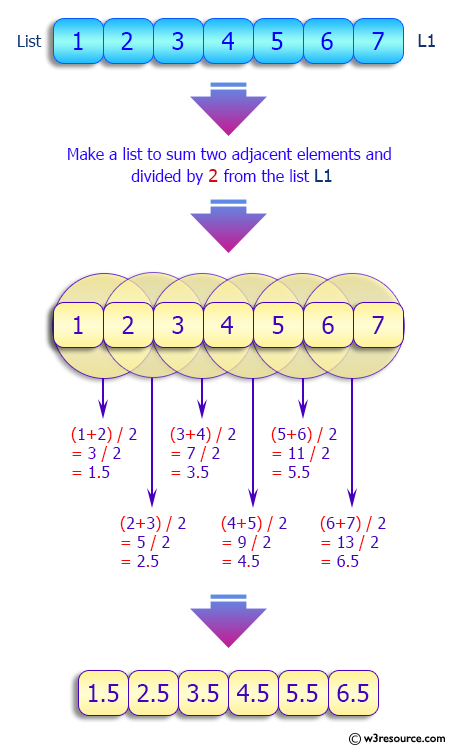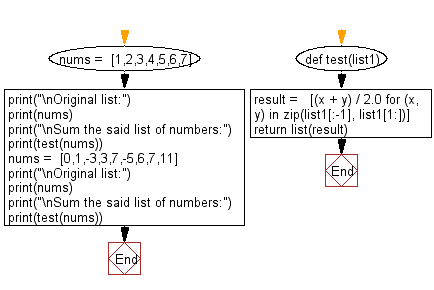Python: Sum a list of numbers
Pairwise Average of List
Sum a list of numbers. Write a Python program to sum the first number with the second and divide it by 2, then sum the second with the third and divide by 2, and so on.
Equation: (element 0 + element 1) / 2, (element 1 + element 2) / 2, ... etc.
Visual Presentation:

Sample Solution:
Python Code:
# Define a function 'test' that calculates the average of adjacent elements in a list.
def test(list1):
# Use a list comprehension to iterate over adjacent elements in 'list1'.
# Calculate the average of each pair of adjacent elements and store the results in a list.
result = [(x + y) / 2.0 for (x, y) in zip(list1[:-1], list1[1:])]
return list(result)
# Define a list of numbers 'nums'.
nums = [1, 2, 3, 4, 5, 6, 7]
# Print a message indicating the original list.
print("\nOriginal list:")
# Print the original list of numbers 'nums'.
print(nums)
# Print a message indicating the purpose of the following lines of code.
print("\nSum the said list of numbers:")
# Call the 'test' function to calculate the averages of adjacent elements in 'nums' and print the result.
print(test(nums))
# Define another list of numbers 'nums'.
nums = [0, 1, -3, 3, 7, -5, 6, 7, 11]
# Print a message indicating the original list.
print("\nOriginal list:")
# Print the original list of numbers 'nums'.
print(nums)
# Print a message indicating the purpose of the following lines of code.
print("\nSum the said list of numbers:")
# Call the 'test' function to calculate the averages of adjacent elements in 'nums' and print the result.
print(test(nums))
Sample Output:
Original list: [1, 2, 3, 4, 5, 6, 7] Sum the said list of numbers: [1.5, 2.5, 3.5, 4.5, 5.5, 6.5] Original list: [0, 1, -3, 3, 7, -5, 6, 7, 11] Sum the said list of numbers: [0.5, -1.0, 0.0, 5.0, 1.0, 0.5, 6.5, 9.0]
Flowchart:

For more Practice: Solve these Related Problems:
- Write a Python program to compute pairwise averages of adjacent elements in a list and round the results to the nearest integer.
- Write a Python program to calculate the pairwise averages for a list of floating-point numbers and return a new list of these averages.
- Write a Python program to compute the difference between each consecutive pairwise average in a list.
- Write a Python program to compute pairwise averages and then filter out those averages that fall below a specified threshold.
Python Code Editor:
Previous: Write a Python program to find the common tuples between two given lists.
Next: Write a Python program to count the number of groups of non-zero numbers separated by zeros of a given list of numbers.
What is the difficulty level of this exercise?
Test your Programming skills with w3resource's quiz.
